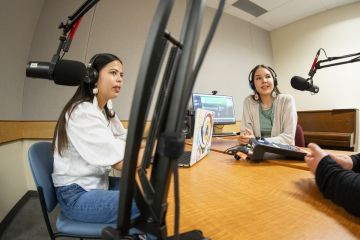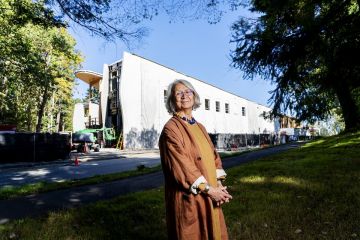International Day for the Elimination of Racial Discrimination
- University of Victoria
On March 21, 2022, UVic supports the United Nations in the work to #FightRacism. This year’s International Day for the Elimination of Racial Discrimination is themed around “voices for action against racism”, aiming to highlight meaningful participation in decision-making processes to prevent and combat racial discrimination, peaceful assembly, protecting civic space, and recognizing people and groups that have contributed in anti-racism work.
UVic was ranked this past year through Maclean’s magazine as Canada’s top comprehensive university and continues to be recognized as one of Canada’s best diversity employers.
As part of “voices for action against racism” we would like to highlight some of the existing work that the people of UVic have done in the past year and resources to share to further advance the work to combat racial discrimination.
Anti-oppression education
March 28
Kil KaahlGalangdal – ‘Hear Someone’s Voice Before You See Them’: Anti-Oppression Key Principles, Knowledges, and Equity-Focused Action-Based Frameworks
Yahlnaaw (she/her), Indigenous Rights and Anti-Racism Officer in the Equity and Human Rights Office leads this new workshop. Yahlnaaw is a Skidegate Haida, queer, transgender woman, which often feels like limbs stretched into many intersecting worlds. Topics covered will include, but are not limited to: white supremacy, white privilege, (systemic) racism, (implicit) bias, racialization, white fragility, settler moves to innocence, microaggressions, colonization, decolonization, Indigenization, Rematriation, MMIWG2S, intersectionality, and EDI.
Register for this workshop and other sessions offered regularly through Learning Central.
Explore the details of this workshop and other training opportunities as well as anti-racism resources through Equity and Human Rights.
Events
With Love, from BIPOC artists to you
March 18 – 22
9 a.m. – 4 p.m.
Room A111
UVic Visual Arts Building
With Love, is centred around sharing BIPOC experiences and stories. By creating a space that recognizes and encourages cultural diversity, we hope to take an impactful step towards understanding how individuals navigate the world on their own terms. As we move forward, our goal is to spark more opportunities for the BIPOC community while also highlighting the potential of these spaces to incite change within the institutional system. Through this project we hope to contribute towards learning and building a language to collectively discuss our experiences.
Students of colour mental health workshop
Monday, March 21
5:30 – 7:30 p.m.
Student Union Building
Students can register online
The Students of Colour Collective is hosting a mental health workshop led by Joban Dhanoa, a racialized counsellor. This workshop offers a safe space to discuss how to support friends who are struggling, feelings of loneliness and being overwhelmed, racial trauma, and how to access help or resources.
Create to Connect art contest
Create to Connect is a collaborative art contest led by the Students of Colour Collective and the Human Rights Education Volunteers. Students are invited to submit their art around themes involving celebrating personal identity, challenging discrimination, social innovators of colour, and imagining a world free of discrimination.
Lectures and seminars
Building an anti-colonial digital archaeology in the Canadian context
Monday, March 21
In person and online
11:30 a.m. - 12:50 p.m.
Cornett Building Room B112
Dr. Neha Gupta: University of British Columbia, Okanagan discusses efforts to centre Indigenous data governance principles in digital archaeology, and how we might build an anti-colonial archaeology by assessing strategic resources (i.e. material, social and ideological) needed to redress structural inequalities in the digital age.
Legalized Racism from the Local to the Global: The Case of Nikkei People in the 1940s
Wednesday, March 23
3 - 4:30 p.m.
Online
During and after the Second World War, civilians of Japanese descent were uprooted, interned, dispossessed and displaced in allied countries across the Americas and the Pacific. In the United States, over 115,000 people were incarcerated. In Canada, 22,000 were uprooted, and the majority interned. An estimated 80 per cent of Japanese Mexicans were displaced and dispossessed. Australia was a regional internment hub, with Nikkei civilians confined in camps alongside displaced Nikkei from nearby islands; almost all were expelled to Japan after the war. On this unprecedented panel, legal experts in each of these contexts will share their research on the intersection of racism and war in the law and the varied legal practices that enabled injustice.
Indigenous and Non-Indigenous Legal Traditions in Canada: Some Challenges
Thursday, March 24
5 p.m.
Centre for Studies in Religion and Society
Dominique Leydet, Professor of Philosophy and Director of the Centre de recherche interdisciplinaire sur la diversité et la démocratie (CRIDAQ) at the Université du Québec à Montréal (UQAM) presents on the growing critical discussion of conditions for dialogue between Indigenous and non-Indigenous legal traditions in Canada. One condition often mentioned is that participants should be able to express their traditions ‘in their own terms.’ This expression is deceptively simple and covers difficult issues—conceptual and practical—that are compounded by asymmetries in power between Indigenous and non-Indigenous peoples. Surveying a range of interpretations of this expression, Dominique reflects on what its concretization in law may require from non-Indigenous participants in different contexts.
In February, the UVic School of Music hosted a concert and a discussion panel on the subject on diversifying and decolonizing music at UVic.
View the recording of Amplifying Voices: Integrating underrepresented identities in music
Research and initiatives
Landscapes of Injustice Project
The Landscapes of Injustice Project has a digital database containing materials from many archives to provide visitors with records related to the Japanese Canadian history and the dispossession of their lands in 1940. There are also teacher resources, a digital storytelling website and other resources available.
Anti-Asian racism
Nigel Mantou Lou is a UVic psychologist who has recently published a paper through the American Psychological Association on, “Chinese Canadians’ experiences of the dual pandemics of COVID-19 and racism: Relations with identity, negative emotion, and anti-racism incident reporting”. This was in collaboration with researchers from the University of Alberta and the Angus Reid Institute.
Read the Q&A with Nigel on anti-Asian racism during the pandemic
Student Life Grant + Anti-Racism Supplement
Students can apply for the UVic Student Life Grant to fund their ideas for initiatives that engage and positively impact the UVic campus community. Additional grant funding is provided if your initiative supports work in addressing racism using anti-racism strategies. For example, PhD student Matty Cervantes used the grant to create a visual storytelling project to bring awareness to climate justice, climate action, environmental rights, human rights and social change. Listen to the accompanying podcast.
Upcoming commitments
In Dec. 2021, UVic signed the Scarborough Charter on Anti-Black Racism and Black Inclusion in Canadian Higher Education along with other post-secondary institutions as a commitment to hold ourselves accountable to its principles and actions.
The campus-wide Equity Action Plan is in development right now. UVic community members are invited to engage with its development by providing feedback throughout the multiple phases of engagement and development. Share your experiences around existing barriers to equity and/or provide suggestions on how we can make the campus a more equitable and inclusive environment for all.
In this story
Keywords: administrative, student life, diversity, racism




